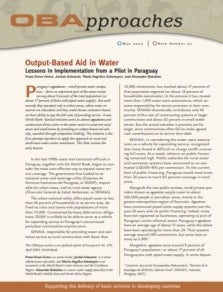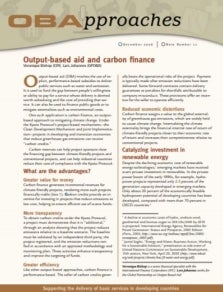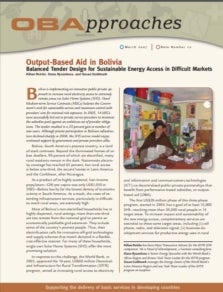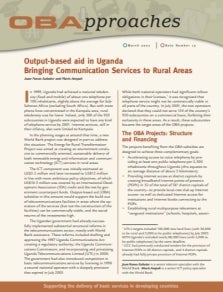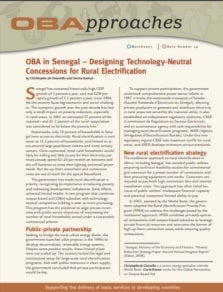Resources
-
Output-Based Aid in Water: Lessons in Implementation from a Pilot in Paraguay
Paraguay's aguateros—small private water companies— form an important part of the water sector, serving about 9 percent of the total population (or about 17 percent of those with piped water supply). But until recently they operated only in urban areas, where water resources are abundant and…
OBA07 Paraguay water(604.29 KB)Date: 2005
Tags: Water and Sanitation
Region: Latin America and Caribbean
Country: Paraguay
-
Output-based Aid and Carbon Finance
Carbon finance is an output-based approach to mitigating climate change. Under the Kyoto Protocol’s project-based mechanisms—the Clean Development Mechanism and Joint Implementation— projects in developing and transition economies that reduce greenhouse gas emissions can receive “carbon credits…
OBA11 Carbon Finance(341.4 KB)Date: 2006
Tags: Climate Change
Region: Global
Country: Global
-
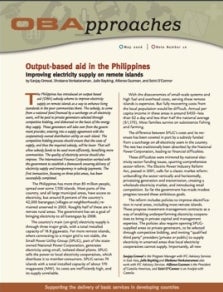
Output-Based Aid in the Philippines: Improving Electricity Supply on Remote Islands
The Philippines has introduced an output-based aid (OBA) subsidy scheme to improve electricity supply on remote islands as a way to enhance living standards in the poor communities there. The subsidy, to come from a national fund financed by a surcharge on all electricity users, will be paid to…
Output-Based Aid in the Philippines: Improving Electricity Supply on Remote Islands(268.56 KB)Date: 2006
Tags: Energy, Fragile Situations
Region: East Asia and Pacific
Country: Philippines
-
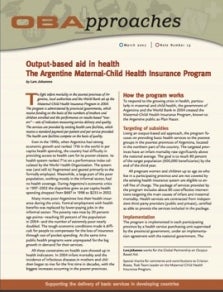
Output-Based Aid in Health: The Argentine Maternal-Child Health Insurance Program
To fight infant mortality in the poorest provinces of Argentina, local authorities and the World Bank set up the Maternal-Child Health Insurance Program in 2004. The program is administered by provincial governments, which receive funding on the basis of the numbers of mothers and children…
Date: 2007
Tags: Health
Region: Latin America and Caribbean
Country: Global, Argentina
-

Output-Based Aid in Health: The Argentine Maternal-Child Health Insurance Program
To fight infant mortality in the poorest provinces of Argentina, local authorities and the World Bank set up the Maternal-Child Health Insurance Program in 2004. The program is administered by provincial governments, which receive funding on the basis of the numbers of mothers and children…
ARGENTINA: Provincial Maternal and Child Health Insurance. A Results-Based Financing Project at Work , OBApproaches13 ArgentinaHealth(210.61 KB)Date: 2007
Tags: Health
Region: Latin America and Caribbean
Country: Global, Argentina
-
Output-Based Aid in Bolivia: Balanced Tender Design for Sustainable Energy Access in Difficult Markets
Bolivia is implementing an innovative public-private approach to increase rural electricity access to extremely remote areas via Solar Home Systems (SHS). Novel Medium-term Service Contracts (MSCs) balance the Government’s wish for sustainable service and maximum control with providers’ aim for…
OBApproaches12 Bolivia(253.21 KB)Date: 2007
Tags: Energy
Region: Latin America and Caribbean
Country: Bolivia
-
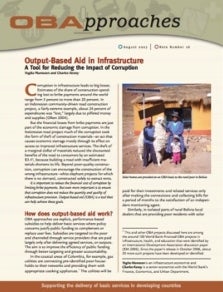
Output-Based Aid in Infrastructure: A Tool for Reducing the Impact of Corruption
Corruption in infrastructure leads to big losses. Estimates of the share of construction spending lost to bribe payments around the world range from 5 percent to more than 20 percent. It is important to reduce the financial cost of corruption by limiting bribe payments. But even more important…
OBApproaches16 Corruption(256.74 KB)Date: 2007
Tags: Energy, Water and Sanitation
Region: Global
Country: Global
-
Output-based aid in Uganda: Bringing Communication Services to Rural Areas
In 1999, Uganda had achieved a national teledensity (fixed and mobile) of about one telephone per 100 inhabitants, slightly above the average for Sub- Saharan Africa (excluding South Africa). But with most phone lines concentrated in the Kampala area, rural teledensity was far lower. Indeed,…
Date: 2007
Tags: Energy, Telecommunications
Region: Africa
Country: Uganda
-
OBA in Senegal: Designing Technology-Neutral Concessions for Rural Electrification
Nationwide, only 30 percent of households in Senegal have access to electricity. Rural electrification is even lower at 12.5 percent of households, and limited to areas around large population centers and some tertiary centers. Once connected, most rural households would likely be willing and…
OBApproaches14 SenegalElectric ,(207.95 KB)Date: 2007
Tags: Energy
Region: Africa
Country: Senegal
-
OBA in Senegal: Designing Technology-Neutral Concessions for Rural Electrification
Nationwide, only 30 percent of households in Senegal have access to electricity. Rural electrification is even lower at 12.5 percent of households, and limited to areas around large population centers and some tertiary centers. Once connected, most rural households would likely be willing and…
Date: 2007
Tags: Energy
Region: Africa
Country: Senegal



